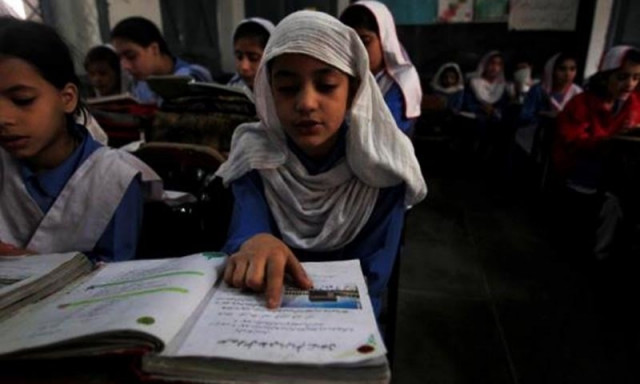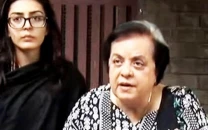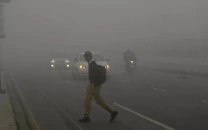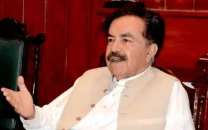Over 50% Khyber-Pakhtunkhwa girls still out of school: Alif Ailaan
The education campaigners, however, praise the provincial govt for 'radical improvements' in renewed reform push

PHOTO: FILE PHOTO
The situation in Khyber-Pakhtunkhwa (K-P) has been particularly pressing on this account. With Pakistan in the throes of a protracted struggle against terrorism, public education in the province continues to be encumbered by the twin forces of Afghan refugees and internally displaced people.
Recent gains in the fight against militants have contributed to some semblance of peace and a political leadership that had pledged to impose an education emergency if elected has held office for a near full term.
Alif Ailaan, the education campaigners, recently released a report analysing the progress and pace of education reforms in the province since the former provincial government launched the Education Sector Plan (ESP) in 2010.
Children of Balochistan remain 'the most abandoned' of all Pakistani children, reveals Alif Ailaan report
While recognising the formidable challenges K-P continues to grapple with, the report has termed the plan "more ambitious and less practical". However, the ESP launched in 2016 has been praised for bringing about "radical improvements" across province-wide public schools.
According to Alif Ailaan, government efforts to transition from exclusive focus on input delivery methods to ensuring institutional reform was "very visible in how the document reads and the objectives and priorities it identifies". But with 51% of girls still not enrolled, the report qualified the successes registered.
Breaking down the performance of the government in the sector, Alif Ailaan relied on four development indicators to measure the 'education emergency'. These included improvement in government schools, education quality, financial reform and the provision of data for public use.
Improving government schools
According to National Education Management System estimates, almost 80 per cent of all the schools in K-P are public schools. Over 70% students enrolled across the primary to higher secondary levels frequent government schools.
In the report, Alif Ailaan noted there had been a "substantial improvement" in the provision of physical facilities in schools over five years. The province registered a remarkable increase of over 25% in the District Education Ranking score from 2013 to 2016 and topped the primary school infrastructure index nationwide. The education campaigners said the government had provided 83,000 missing facilities across nearly 24,000 schools, spending about Rs29.11 billion on the project.
Over 5,000 schools had been provided with sports kits to encourage "healthier and active lifestyles" and nearly 1,170 information technology labs have been established across high and higher secondary schools. Citing Pakistan Education Statistics 2015-2016, the report observed there were still 2.5 million out-of-school children across the province. The challenge of enrolling them remained "largely unresolved", the report added.
Alif Ailaan commends Sindh education reforms, laments 'speed with which they take effect'
In a revealing observation, the report noted girls were at a "greater disadvantage" with over half (51%) not attending school. The government has taken steps to address the problem, the report added. These include the provision of stipends to girls registering regular attendance and the establishment of exclusive community schools. Also, recent data indicated that primary schools outnumbered cumulative middle and high schools by 4:1, the report highlighted, terming it the root cause of a "crisis of student retention".
Quality standards
The province was facing a learning crisis, according to Alif Ailaan. This was epitomised by 2016 National Achievement Test scores with K-P children lagging behind the national mean.
Improvements were forthcoming with exemplary teacher recruitment ensuring "rationalised" deployment. The report said 40,000 educators had been recruited through the NTS since 2013. Another 17,000 are being hired.
The government has also revamped recruitment criteria, radically raising competition against vacancies. Over 65,000 teachers have been trained since 2013 with Rs800 million being allocated for greater student learning.
Financial reforms
Alif Ailaan has called on the provincial government to "spend more, more effectively" noting that "budget increases which do not translate into improved utilisation are practically ineffexctive". Commending K-P for being the the only province in Pakistan that had consistently allocated budgets higher than the UN recommended 20% baseline, statistics quoted by Alif Ailaan revealed that the education budget increased from Rs84.629 billion in 2013 to Rs168.085 billion to date. This represented an increase of about 61% over the 2013 education budget - with 17% coming in the current fiscal year over the previous one.
School-based budgeting had also enabled middle and primary schools to prepare budgets and track expenditure, according to the education campaigners. However, while increased budget allocations had led to incremental improvements in physical infrastructure, teacher pay and student enrolment, outlays were "still insufficient" to fully address problems confronting the sector, the report stated. The document also questioned how "funds are allocated and used".
The government was also criticised for seizing textbook board assets worth Rs6 billion. The reallocation, according to the report, could delay the printing and distribution of books among students at government schools.
Revamping data provision and management
Accurate and timely data not only facilitates evidence-based policy interventions but also informs policy research that can steer policy making apparatuses in the right direction, the document stated. In this regard, the government had established an Independent Monitoring Unit collecting school data. The Unit tracks teacher and student attendance, and availability of facilities. Because of the increase in accountability, absenteeism decreased by nearly 15% and student attendance rose by 24%.
Policy blind spots
While Alif Ailaan hailed the Free and Compulsory Primary and Secondary Education Act and the Khyber Pakhtunkhwa Private Schools Regulatory Authority Act 2017, it also identified policy blind spots and presented recommendations to remedy them.
Mixed review: Punjab praised for 'tremendous strides' in education service delivery
The report advised the government focus on all means to dramatically raise middle and high school enrolment. The dovument said great attention should be devoted to schools and conveyance among other measures to improve girls' access to post-primary education.
According to Alif Ailaan, K-P needed to devote attention to learning outcomes in maths and science. Events should be regularly organised, indigenous content formulated and delivery mechanisms developed to stimulate student interest, read one recommendation.
An out-of-school census conducted by the government should be made public, the report recommended. This should be coupled with a commitment on periodic regularisation, the education campaigners added. The document also called for the inclusion of the differently abled into regular schools and curriculum revisions to reflect that.
"Gains made since 2013 are not permanent. Without sustained efforts, a sharper focus and an even stronger political will, these may suffer being erased," Alif Ailaan warned in conclusion.



















COMMENTS
Comments are moderated and generally will be posted if they are on-topic and not abusive.
For more information, please see our Comments FAQ